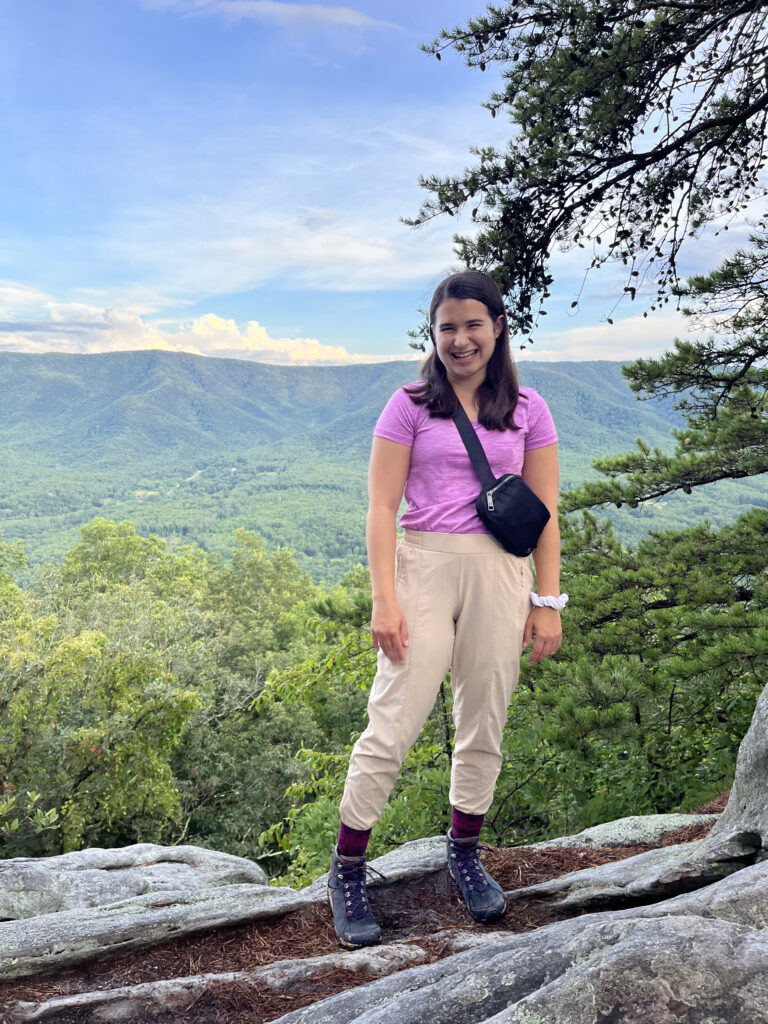
Photo Credits: Nora Terrill
Senior Talia Cartafalsa (Environmental studies & chemistry double major) conducted research this summer with Dr. Chelsea Peters as part of the Summer Scholars Program. Her project titled, An on campus collaborative restoration of landfill and degraded suburban ecosystems, started last spring when she was Dr. Peters’ advisee, and wanted to find a way to get involved in research with an environmental focus implementing both her environmental studies and chemistry backgrounds.
Using soil samples, drone surveys, and analyses of previously collected data, she discovered that the landscapes, a landfill site (planning to turn into a native meadow), two drainage ditches, and a wooded lot (planning to tun into a native forest), on Elizabeth campus in the environment center were lacking in plant-supporting nutrients like nitrogen and phosphorus. Since then, seasonal resampling and retesting has been done in correspondence to various restoration acts such as spreading compost, tilling the soil, spraying herbicide etc., allowing the chemical composition of the soil to become more homogeneous. Additionally, conducting drone surveys, in collaboration with Radford University and now an RC alum, allowed her to see the visual impact of change over time; it has also been useful for map making and gathering information such as site slope and watershed outlines.
Furthermore, Talia and other RC students hosted their second literacy event this year and it went really well. The goal of the environment center is to turn it into an outdoor classroom and learning center for younger, underprivileged kids. She said it was a great opportunity to teach the surrounding community rather than conduct research and it was very rewarding.
When asked what the most difficult part of the project was she said things change day to day, season to season especially in environmental science, and plans that are made do not always get done because of this; her original project proposal for wetland construction changed as well as her project title and vision as a result. Talia said going through that process was hard to adjust to mentally, but she is happy with her new project and likes where it is going. With her new project, the process has been a great experience and having background knowledge on the research allowed her to refine the direction she wanted to go in, and she also enjoyed the addition of the professional development events.
With this research, Talia has started writing a paper in hopes of publication. She explained that a majority of this project is unique to Roanoke College and it is hard to explain, but the strength in this is that future research could look at this small liberal arts school and use what was found in their own restoration projects. She is excited to see how the next generations of RC students expand on this project and discover the progress that has been made as an alum. Talia wants to achieve restoration of spaces on Roanoke College’s main campus as well as show that students, faculty, and the Roanoke community can work together to take an unhealthy utilized space and turn it into something useful.
As an environmental studies and chemistry double major, Talia’s career aspirations include applying to PhD programs involving coastal work, and this research has allowed her to build a project from the ground up where she can apply these skills in other places.
If you have any interest in environmental science or being outdoors, be on the lookout for posters in the life science building for service projects hosted by the environmental center open to the public!